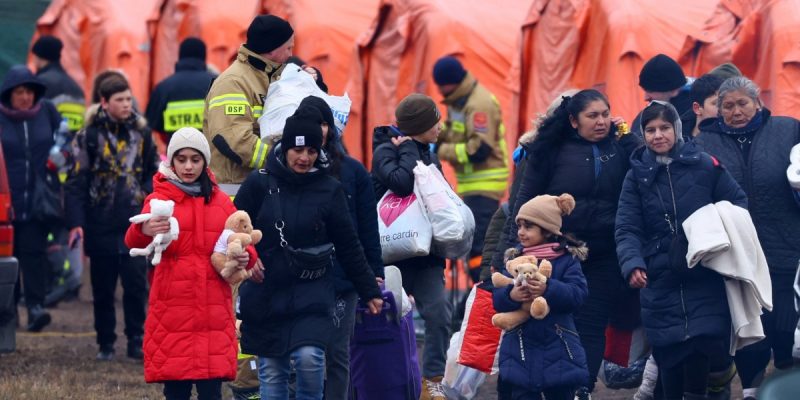Stuffing two small suitcases with the bare essentials, the friends boarded a train and fled west to Poland, then Berlin, then Rome, where their difficulties began in earnest.
Having been told they qualified for temporary EU residency, they tried to find shelter at a Ukrainian Orthodox church on Rome’s outskirts, where Ukrainians were packing huge trucks with medicine and supplies to be transported to the Polish border — only to be turned away because they weren’t Ukrainian citizens.
For those who avoid outright racism and abuse at Ukraine’s borders — a fate also suffered by many in the country’s sizable Roma community — the EU offers something more blandly insidious.
They received a warm welcome at Berlin’s central station, and were told how to get free train tickets by Julia Damphouse, who has been helping coordinate the thousands of refugees turning up at the station every day.
This all gave them the impression that they would be afforded the same rights as Ukrainian nationals: a one-year guarantee of residency in any EU country if they had long-term Ukrainian residency permits.
Instead of being given a temporary waiver, non-Ukrainians resident in Ukraine would have to prove that going home would put them in danger, or else go through the arduous, years-long process of applying for general asylum.
What this meant, exactly — and whether these refugees would ultimately be granted asylum — would be at the discretion of the host country.
Damphouse, for instance, encountered a large number of non-Ukrainians in the first few days, she said, but that has since dwindled to a thin trickle, and she suspects that’s because the rules have since been tightened, leaving those who did make it through initially, like Mariam and Yahya, in a kind of awkward limbo.
It might not seem obvious why people from countries that are not sufficiently perilous can’t just go home — why, say, Mariam and Yahya cannot simply return to Morocco.
Even sensible concessions — such as letting non-Ukrainians stay with already resident family members, as Mariam hoped to do — are either not permitted or are permitted at random, noted Damphouse.
One of the main organizers at the shelter, a kindly man in his seventies, made calls to various government agencies dealing with the crisis: he soon managed to get Yahya on a waiting list for a room in one of several shelters available.
After multiple attempts, they finally connected with the previously unresponsive emergency refugee hotline and were told to go to a police station inside Rome’s central station, where the polizia ferroviaria, the railroad police, would help Yahya find a place.
Immediately upon arrival, Mariam and Yahya were seriously worried they had walked into a trap.
When a bystander remarked that a test would only cost €15 in any pharmacy, they folded and sent her off to get one, dispatching the armed guards to flank her as she did so.
It’s an echo of the chaos last year, when Belarus retaliated against EU sanctions by encouraging large numbers of migrants to cross over into the EU: many were met with swiftly erected fences and violent pushbacks at the hands of Polish and Lithuanian border guards.
Peers, the EU law expert, said that in the heat of large crises, important decisions are often left to the private whims of individuals, in this case immigration officials, and those decisions may be subsequently overturned as rules become more clear, dashing any hopes briefly stirred.
And so, the squat police chief lumbered from his office and told Yahya that he had been assigned to a refuge in the expansive nothingness of the northern Lazio countryside, a place run by volunteers and nuns.
At last he arrived at the place, an expansive, paradisiacal complex with a chapel, meticulously tended gardens, clean dormitories, and a large dining room serving three hot meals a day, all closed off to the outside world by a heavy iron gate.
They could only offer accommodation for a limited period, after which the refugees would be dispersed at random around the country, as with the hundreds of Afghans who stayed in the shelter the previous year.
For weeks, he found himself sitting around listlessly, bored out of his mind, too far from Rome to look for work, receiving little help from the volunteers.
She turned up, expecting a breeze through the usual formalities, but instead there was bad news: she wouldn’t be given long-term residency, the police told her, because her country was not at war.
Ben Munster is a Rome-based financial journalist.
